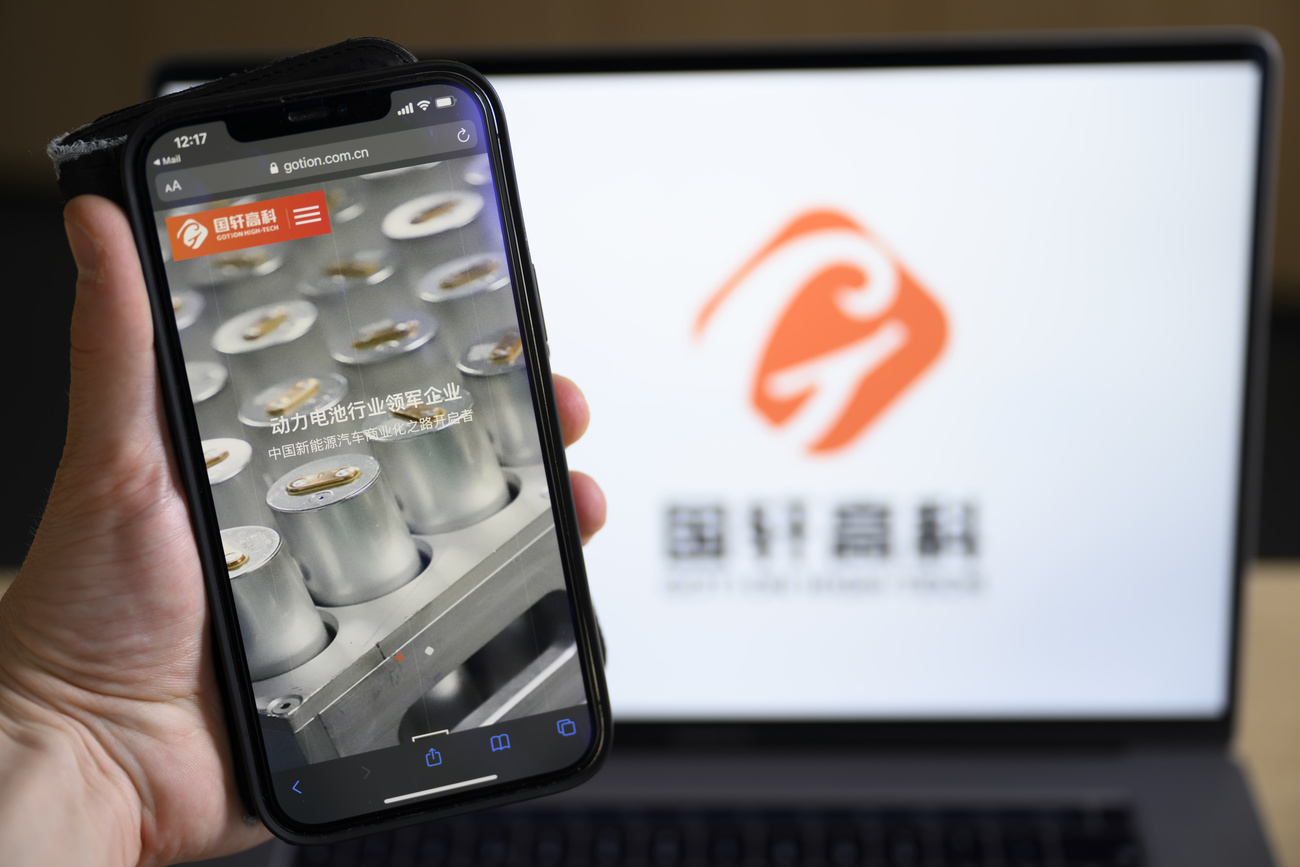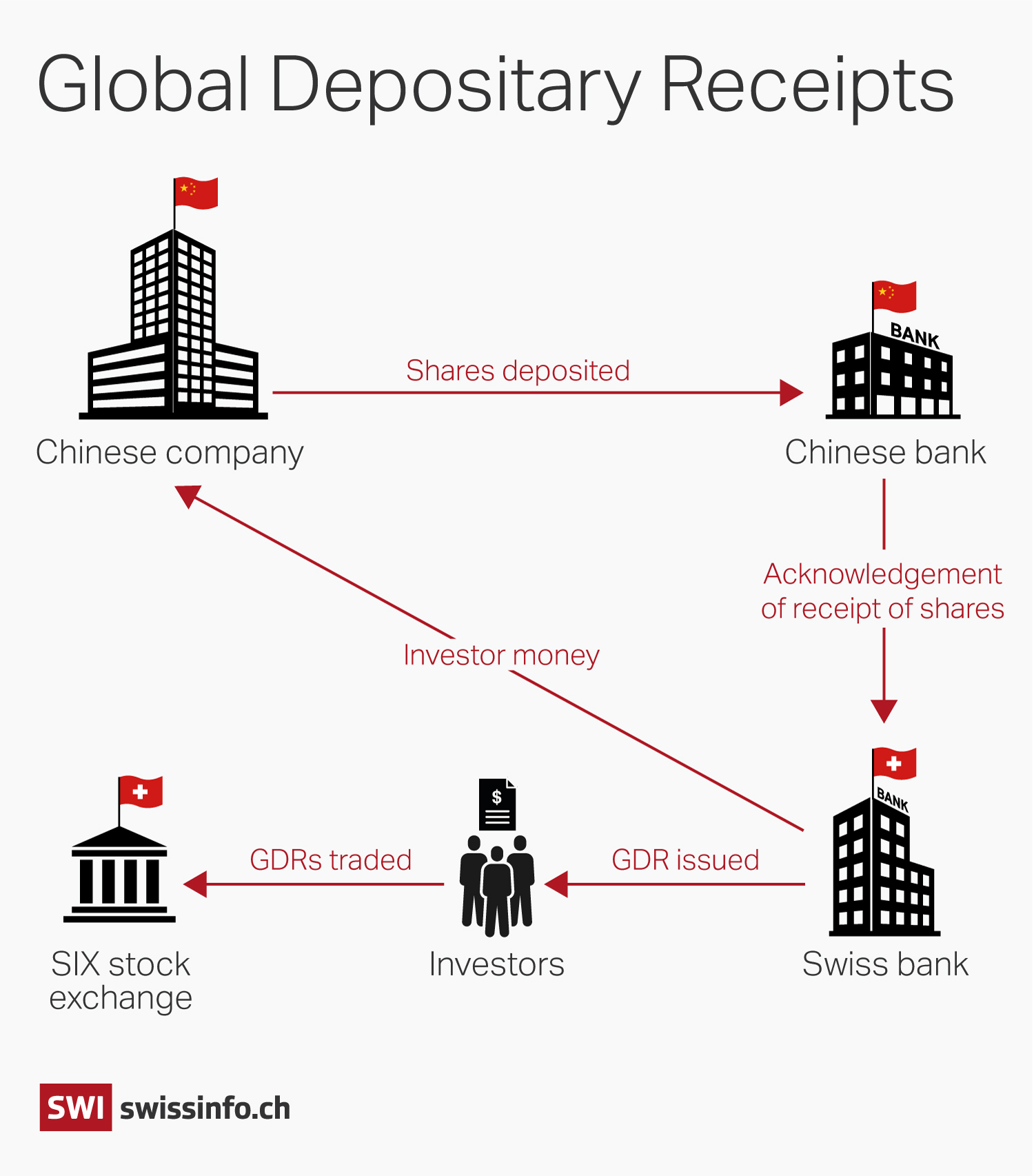
Swiss stock exchange turns to China after being shunned by EU

Frozen out of the European Union trading market, the Swiss stock exchange has turned to a new source of business: the indirect listing of Chinese company shares.
But despite 14 Chinese companies raising some CHF4.4 billion ($4.9 billion) by listing Global Depositary Receipts (GDRs) on the Swiss exchange in the last 12 months, the scheme has yet to prove a money spinner for Switzerland.
For SIX Group, which runs Switzerland’s largest stock exchange, the arrival of Chinese companies could provide a welcome boost to trading revenues. In 2019, the exchange was banned from trading European Union company shares following a diplomatic impasse between Switzerland and the EU.
+ Why more Chinese firms will come to Switzerland
To get around differences in the financial regulations of each country, SIX allows Chinese firms to list GDRs – which are certificates that represent shares of a company that can be converted into its stock following a 120-day lock-in period.
The idea is that investors then sell their GDRs to others, thus creating a secondary trading market for the financial instrument. But the novelty has yet to catch on, resulting in pitiful trading volumes (liquidity) and a dearth of revenues for the exchange.

Depending on the company, investors have hauled between 40% and 70% of their GDRs off the Swiss stock exchange after the lock-in period and converted them into normal shares listed in China.
Investors are cashing in on a quirk in the system that allows them to issue GDRs at a discount to normal shares and then pocket the difference when they convert them into company stock.
“Whether or not there will be more secondary market liquidity for GDRs in the near future remains to be seen,” Christian Schneiter, of the Vischer law firm in Zurich, told SWI swissinfo.ch.
Slack IPO period
SIX Group, which runs Switzerland’s largest stock exchange, hopes volumes will build momentum once traders get used to the financial instrument.
Schneiter sees a bright spot with the lifting of Covid-19 lockdowns in China at the end of last year, meaning Chinese firms can now send teams to Switzerland to promote their companies and the GDR investment opportunities.
Gong Weiyun, managing director of the China Construction Bank in Zurich is adamant that political tensions between China and the West have played no part in the poor trading performance of GDRs.
“European investors know little about these players, their activity, their market shares, their rate of growth, their projects,” he told the AWP news agency. “If investors were more familiar with Chinese companies and had more information, trading in these securities would certainly pick up.”
Win-win?
On paper, the China-Switzerland Stock Connect Program, which was set up in July 2022 to facilitate GDR listings on SIX, is a win-win. Chinese companies tap into European investors, who in can diversify their portfolios with Chinese investments.
SIX Group hopes to cash in as intermediary during a period of slack initial public offering (IPO) activity worldwide, with the exception of China. Consultancy group Ernst & Young says 45% fewer companies went public on exchanges last year compared to 2021.
+ Read how Chinese companies painted Switzerland red
IPOs dropped off significantly in Europe and the United States but remained stable in China last year. In a December report EY said China’s share of the global IPO market rose from 28% in 2021 to 55% last year.
“Activity on the Swiss stock exchange in 2022 was largely shaped by the listing of GDRs by Chinese companies,” said EY, highlighting a grand total of 13 company listings in Switzerland, which included eight Chinese companies.
So far in 2023, three companies have listed on the Swiss stock exchange – all of them Chinese. Electronic goods manufacturer Kunshan Dongwei was the latest Chinese firm to raise funds in Switzerland in June, while 30 other Chinese companies have reportedly expressed interest in following suit.
“The pandemic revealed weaknesses in global supply chains,” SIX Group spokesperson Jürg Schneider told SWI swissinfo.ch. “To prevent future supply disruptions, companies are increasingly interested in building local production sites to minimise such risks. GDRs serve as a means to raise capital for these companies to realise their brick-and-mortar strategy.”
Geopolitical tensions
The advent of Chinese GDRs in Switzerland has coincided with growing tensions between China and the US that have impacted a similar Wall Street arrangement known as American Depositary Receipts (ADRs).
The impasse appears to have been resolved in December with China agreeing to US audits of its companies listing ADRs, but not before several Chinese companies threatened to walk away from the US market.
Companies use Depositary Receipts to raise funds in a country that has different stock market or auditing regulations than their own or if foreign investors are restricted from directly owning shares in the firm.
They are certificates representing common shares of an international company and are touted as reducing the complexity of cross-border trading and currency exchange risks.
American Depositary Receipts (ADRs) were first issued in 1927, according to the US Securities and Exchange Commission.
Other versions, such as the European Depositary Receipt and Global Depositary Receipt followed.
Switzerland demands no such audit and fully accepts Chinese accounting and auditing principles under the Stock Connect scheme.
SIX Group CEO Jos Dijsselhof dismisses concerns that this makes Switzerland a soft touch for Chinese companies because sharp accounting practices would backfire on miscreants.
“If one company blows up and there’s a fraud . . . it will probably be [the] death of the initiative,” he told Nikkei Asia earlier this year.
China has also agreed to stock connect schemes with Britain and Germany, but each of these countries has only attracted five and zero listings respectively.
“Political considerations might be taken into account when making a listing decision,” said Schneiter, whose company has advised numerous Chinese GDR listings in Switzerland. “The fact that Switzerland is considered a politically neutral country might play a certain role.”
Teething troubles
Despite following European Union sanctions packages against Russia, Switzerland has defended its neutral reputation by refusing to either impose unilateral measures or to allow Swiss-produced weaponry to be sold to Ukraine.
The GDR experiment must still navigate teething troubles before its success can be judged. China is reviewing the way it approves such listings in light of the rapid conversion of GDRs into normal company shares.
The regulatory review in China has created a bottleneck in new GDR listings. SIX Group says it is too early to judge how this will affect the stock connect system as “some elements need to be clarified”.
Schneiter expects the new rules will result in longer waiting times for approval in China. “How much longer remains to be seen,” he said.

In compliance with the JTI standards
More: SWI swissinfo.ch certified by the Journalism Trust Initiative































You can find an overview of ongoing debates with our journalists here . Please join us!
If you want to start a conversation about a topic raised in this article or want to report factual errors, email us at english@swissinfo.ch.